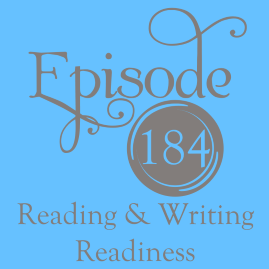
This episode discusses what Charlotte Mason advised for the early years, before formal school lessons, in the areas of reading and writing. Emily, Liz, and Nicole share from her writings, the Parents’ Review, and their own life experience about when the appropriate time is to begin these skills, how not to push, but how to encourage a young child to prepare them and make the most of their natural interest.
Listen Now:

Home Education (Volume 1), pp. 199-222

“…a mother’s first duty to her children is to secure for them a quiet growing time, a full six years of passive, receptive life, the waking part of it spent for the most part out in the fresh air. And this, not for the gain in bodily health alone–body and soul, heart and mind, are nourished with food convenient for them when the children are let alone, let to live without friction and without stimulus amongst happy influences which incline them to be good.” (1/43)
“When should he begin? Whenever his box of letters begins to interest him. The baby of two will often be able to name half a dozen letters; and there is nothing against it so long as the finding and naming of letters is a game to him. But he must not be urged, required to show off, teased to find letters when his heart is set on other play.” (1/202)
“He loves to play at finding his letter,–‘Shew me the letter that stands for baby, etc.,’ and he does so with a look of real pride and pleasure on his face.
“This, of course, should be entirely in the nature of a game; and he should never be teased, or made to find his letters for the sake of showing off, especially when his heart is set on other things. Neither is there any need to hurry him at this stage; if he learn one form at a time, so that he can pick out all the D’s say, big and little, in a page of large print, his progress will at any rate be sure, and the ideas lasting. In naming his letters, let him use simply the sounds of the letters, thus D’ for duck, d-oll, d-og, etc.
“But he should not only be able to recognise letters when he sees them, but must picture them for himself. Give him a tray of sand, in which, with his own finger, he can make the forms of the letters–an amusement which will afford him the greatest delight, for nothing pleases a child more than the feeling of power which he has when he can do something quite by himself. In this way too, not only will his power of observation be cultivated, but he will get his first ideas of making lines and curves.” (Armitage, “First Reading Lessons,” Parents’ Review 12, p. 494)
“And now let us take our child of five and a half or six when he should first enter the home schoolroom and begin his real lessons…Can he read and write? Not always. I do not advocate definite instruction other than what has been sketched out before the child is six. Before that age, many children will have ‘taught themselves to read,’ i.e., picked it up almost without our knowing how. Other children, with the ground well-prepared, will learn reading very quickly, stimulated by the desire to read for themselves the many books they have learnt to love. Writing has possibly gone hand in hand with drawing, and in all probability dexterity has been reached in this also.” (Henrietta Franklin, “The Home Training of Children”, Parents’ Review 19)

The Trouble with Boys, Peg Tyre
Proust and the Squid, Maryanne Wolf
Better Late Than Early, Raymond Moore
Last Child in the Woods, Richard Louv


Thank you for pointing me to episode 46 and also to the relevant material in Home Education which I shall certainly consider. But in the meantime, I just wanted to seek out any thoughts, advice or other relevant episodes you may have relating to children who may be manifesting, dare I call them ‘learning difficulties’, when it comes to learning to read and write.
It can be very discouraging for parents of older children who are still at the very beginning of their reading journey despite employing the aforesaid methods.
Amy.
Amy,
We do address this issue frequently as Nicole and Liz both have had children with reading and writing struggles due to dyslexia and other learning difficulties (Episode 121 may be especially helpful). We understand the frustration. I encourage you to consider the exceeding patience of God, because that is what is required. The method does work, but not on our timetable. In fact, in our experience it has been superior to other traditional methods with children who struggle. Nicole and her son did do an intensive session of a Dyslexia program, and that helped immensely, but continued to use Miss Mason’s methods for Language Arts.
I recently read a well-known author who said, “every hour of reading is an hour of teaching us to write.” This is going to require lots of your time in reading to your student who cannot. I encourage you to peruse all episodes on language arts as we usually address special needs, as well as the one on language acquisition, which describes a process and order that you must honor though the age is slow. You cannot get inside your child and “make” him gain knowledge; it all must come from within him. Children who are patiently, cheerfully, consistently taught do make strides. My slowest learner is 20 and reads valuable books every day.
Liz
Much appreciated Liz. Thank you for your wise and timely words.
Amy,
So glad to be able to help you.